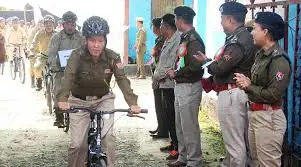Breakthrough likely in the fresh row brewing in Manipur after Centre meets key outfit

Background: The Incident That Sparked Protests
The trouble began when central forces allegedly ordered the removal of the phrase ‘Manipur State’ from a bus transporting journalists to the Shirui Lily Festival in Ukhrul district. The bus was clearly marked with the state’s name, and this act was perceived as an affront to Manipur’s territorial identity and pride. The incident stirred strong emotions among the local population, leading to protests and a 48-hour strike organized by COCOMI.
The protestors demanded an official apology from the state Governor and called for the resignation of three top officials, accusing them of undermining Manipur’s integrity. This event was not just about the bus; it symbolized long-standing grievances over the state’s autonomy and cultural identity.
The Centre’s Response: Meeting with COCOMI
Recognizing the gravity of the situation, senior officials from the Ministry of Home Affairs convened a meeting in New Delhi with representatives of COCOMI. The talks aimed to understand the concerns of the people, address immediate issues, and lay groundwork for restoring peace.
Key Issues Discussed
During the dialogue, COCOMI outlined several critical demands and concerns beyond the bus incident, including:
- Free Movement: Ensuring unrestricted movement of people and goods within the state, which had been hampered by ongoing unrest.
- Protection of Religious Sites: Safeguarding temples, churches, and other sacred places vulnerable to attacks or desecration during violence.
- Compensation for Farmers: Addressing the grievances of farmers affected by the conflict, particularly those who lost crops or land.
- Justice for Missing Persons: Investigating and providing closure on cases of people who went missing during the turmoil.
- Resettlement of Internally Displaced Persons (IDPs): Facilitating the safe return and rehabilitation of displaced communities.
The MHA officials, including Advisor AK Mishra and Joint Director Rajesh Kamble, assured COCOMI that the government was committed to taking appropriate steps to address these issues. Both sides agreed to maintain open communication channels to prevent escalation.
Political and Community Reactions
The Centre’s initiative was welcomed by some groups as a positive step, but it also attracted criticism from others. For example, the Kuki Organisation for Human Rights (KOHUR), representing the Kuki community, opposed the talks with Arambai Tenggol, a Meitei outfit, citing concerns that it legitimized armed extremist groups.
This tension underscores the complex ethnic and political dynamics in Manipur, where various communities—primarily Meitei, Kuki, and Naga—have overlapping and often conflicting interests. Any peace process must navigate these sensitivities carefully to ensure inclusiveness and avoid alienating key stakeholders.
Security Challenges and Militant Activity
Despite efforts to bring peace, Manipur continues to face security issues. Reports indicate that militant groups are active in recruiting youth and engaging in extortion and violence. The recent influx of fighters returning from Myanmar’s civil war has added to the challenge, exacerbating the security situation.
These insurgent activities not only threaten peace but also hamper economic development and normal life. Therefore, any breakthrough in negotiations must be paired with effective security strategies to dismantle militant networks and restore law and order.
Importance of Dialogue and Constructive Engagement
The meeting between the Centre and COCOMI represents an important precedent for conflict resolution in Manipur. It demonstrates the government’s willingness to listen and engage with civil society groups and acknowledge their concerns. Constructive dialogue is essential to bridge divides, dispel mistrust, and chart a path toward reconciliation.
Key to the success of this approach is inclusivity—ensuring that all ethnic and political groups feel heard and respected. This can prevent further polarization and help build a shared vision for Manipur’s future.
Conclusion: Hope for Lasting Peace
While challenges remain, the recent engagement between the Centre and COCOMI provides a glimmer of hope for Manipur’s troubled landscape. Addressing the root causes of the conflict, ensuring justice and rehabilitation, and maintaining security are critical pillars for sustainable peace.
The journey ahead requires commitment, patience, and cooperation among the government, civil society, and communities. With persistent efforts and mutual understanding, Manipur can overcome its current turmoil and move toward stability and prosperity.






